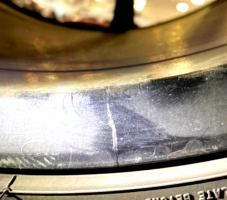
— A Corvette cracked wheels lawsuit is still making its way through the legal system, but the most recent move will see the claims of one plaintiff sent to arbitration.
According to the Chevrolet Corvette cracked wheels class action lawsuit, 2015-2019 Chevrolet Corvette Z06 and 2017-2019 Chevrolet Corvette Grand Sport cars are equipped with defective wheels that crack and deform.
The rims are allegedly not strong enough and will deform and crack under normal driving conditions.
The 18 named plaintiffs claim General Motors equipped the cars with wheels that crack and lose strength, allegedly making the wheels vulnerable to failures.
GM has allegedly concealed the Corvette wheel defects and “is systematically denying [warranty] coverage,” forcing Corvette owners plaintiffs to pay "thousands of dollars out-of-pocket to repair, and if they purchase the replacements from GM, to replace the wheels with equally defective wheels.”
GM filed a motion to dismiss the Corvette cracked wheels lawsuit but the motion was denied as to all claims but the unjust enrichment claim.
Chevy Corvette Cracked Wheels Lawsuit (Arbitration)
According to General Motors, one Corvette owner's claims should be heard in arbitration, not by a court. GM told Judge Bernard A. Friedman plaintiff Derrol Turner agreed to arbitration when he purchased his new Chevrolet Corvette Grand Sport in South Carolina in 2016.
GM contends the contract contains an arbitration provision that covers claims regarding the “purchase, lease, or condition of the vehicle.”
The plaintiff argues his agreement was with the GM dealer where he purchased his Corvette, not with General Motors, which means GM allegedly cannot compel arbitration.
"As stated in the plain language of the arbitration agreement, that agreement was between only Mr. Turner and Crews Chevrolet for any claims that might arise between Mr. Turner and Crews Chevrolet. GM is neither a party to that agreement, nor an intended third-party beneficiary.” — Plaintiff Turner
The plaintiff asserts under the terms of the agreement, arbitrable disputes include only those between the plaintiff and the dealership, Crews Chevrolet. This necessarily means only the plaintiff and the GM dealer may elect to pursue arbitration of those disputes.
General Motors admits it isn't a signatory to the purchase agreement or arbitration provision, but the automaker says it is entitled to enforce the agreement under the principle of equitable estoppel because, “[i]f Plaintiff had not entered into the agreement to purchase his vehicle, he would have no claims against GM.”
GM also argues the purchase agreement “expressly delegates questions of the enforceability and scope of the arbitration provision to the arbitrator[,]” which precludes the judge from resolving any threshold question regarding arbitrability.
Judge Friedman was convinced by GM's arguments and ruled, "IT IS ORDERED that defendant’s motion to compel arbitration of plaintiff Derrol Turner’s claims...is granted."
The Chevrolet Corvette cracked wheels lawsuit was filed in the U.S. District Court for the Eastern District of Michigan: Bossart, et al., vs. General Motors LLC.
The plaintiffs are represented by the Miller Law Firm, P.C., Berger Montague PC, Capstone Law APC, LeVan Muhic Stapleton LLC, Carlson Lynch LLP, Freed Kanner London & Millen LLC, Kehoe Law Firm, P.C.




